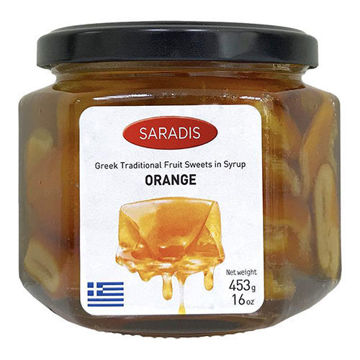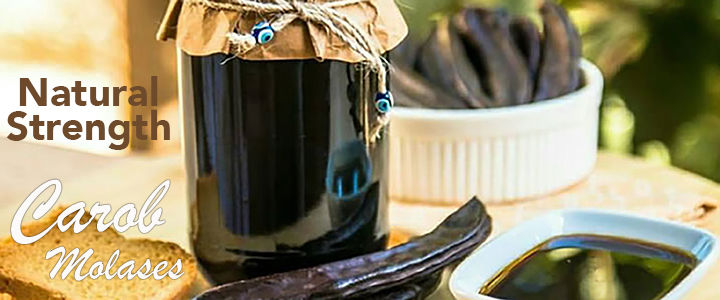English
You have no items in your shopping cart.
Products tagged with 'saradis'
SARADIS Bitter Orange in Syrup 453g
If you are fortunate enough to have family or friends in Greece, you were surely welcomed upon arrival with spoon sweets ("glyko tou koutaliou") ¬ citrus peels, whole fruits, or nuts preserved in translucent sugar syrup. A mainstay of Greek, Turkish, Balkan and Russian culture for centuries, spoon sweets are traditionally offered to visitors as a sign of warmth and hospitality - served in a generous teaspoon with a glass of water, and sometimes coffee. Or, they are presented as an elegant spoonful in center of small dish of Greek yogurt. Saradis has been making spoon sweets on the beautiful Greek Island of Chios since 1928. More syrupy than classic marmalade, Saradis Bitter Orange Sweets feature large pieces of succulent orange peel drenched in syrup – just the right size to fill a teaspoon. Chewy and flavorful, our Bitter Orange Sweets are the perfect marriage of bitter and sweet. They are wonderful chilled, right out of the jar, and delicious with scones, biscuits and cornbread. For a citrusy spin on a brunch classic, slice the bitter orange peels and serve with their syrup on French toast, pancakes or waffles – with a dollop of mascarpone or whipped ricotta for good measure. Or serve as a condiment with a cheese and salami platter. Spread Saradis Bitter Orange Sweets in the center of a baked brie – or in a pan sauce for roasted duck– and your family and friends will thank you!
$10.99
SARADIS Fig Sweets 454g
If you’ve spent any time with family or friends in Greece, spoon sweets – whole fruits, nuts or citrus peels drenched in sugary syrup – will need no introduction! These unique sweets have been a mainstay of Greek, Turkish, Balkan and Russian culture for centuires - offered to visiting guests as a sign of hospitality and warmth. Traditionally served in a generous teaspoon, spoon sweets are meant to be savored between sips of water or coffee. Or to be enjoyed as an elegant centerpiece on a small dish of Greek yogurt. Saradis, has been making spoon sweets on the beautiful Greek Island of Chios since 1928. Our Fig Sweets feature luscious hand-picked whole figs suspended in a sugar syrup. Because our Fig Sweets feature the whole fruit, you will find that they retain their authentic flavor. Soft and succulent, our figs are the “perfect bite” on a teaspoon. Cut them into smaller pieces and serve with their syrup and their culinary uses will be manifest! Use Saradis Fig Sweets as a topping for vanilla ice cream or tart vanilla frozen yogurt and you will be in fig heaven! Serve as a condiment with a cheese platter with Marcona almonds. Add Saradis Fig Sweets to roasted brussels sprouts or butternut squash. Or use them to make a delectable pan sauce for duck, pork or chicken. Once you taste of these uniquely flavorful fig sweets, and they may become a family tradition for you, too!
$10.99
SARADIS Mastic (Mastiha Sweets) 454g
It doesn’t get more authentic than this! If you grew up in Greece, Mastiha, the tear-shaped resin drops of the Mastic Tree, will remind you of home. Mastiha has been a classic culinary ingredient since ancient Greece used to flavor baked goods, ice cream and the traditional Greek liqueur with the same name. The Greek island of Chios has been dedicated to the cultivation and production of Mastiha (mastic gum) since the Byzantine era, with a Protected Designation of Origin (PDO) accorded by the European Union. Saradis has been making “spoon sweets” in Chios since 1928. Traditionally offered as a gesture of warmth and hospitality, the custom in virtually every Greek household is to serve a generous teaspoon of “spoon sweets,” with a glass of water or coffee, to visiting guests. Saradis Mastiha Sweets are made with sugar, mastic oil and water. With a thick and creamy fondant-like texture, our Mastiha Sweets have a unique anise flavor, with hints of vanilla and pine. Also known as a “submarine,” these sweets best enjoyed in the classic way: licked on a teaspoon, like a lollipop, between sips of water. Leave the spoon in your glass between sips, and the water will retain its wonderful mastic gum flavor!
$6.99
SARADIS Orange Peels in Sweet Syrup 454g
Spoon sweets – citrus peels, whole fruits, nuts, vanilla or mastic gum in sugary syrup – have had a special place in Greek, Turkish, Balkan and Russian culture since the Ottoman Era. Offered to visitors as a sign of welcome and hospitality, spoon sweets are traditionally served in a teaspoon with a glass of water or coffee. Or presented as an elegant spoonful in center of small dish of Greek yogurt. Saradis has been making spoon sweets on the beautiful Greek Island of Chios since 1928. Our Orange Sweets feature large peels of ripe, hand-picked oranges suspended in delectable syrup. Chewy, juicy and not too sweet (despite the name!) our Orange Sweets are the “perfect bite” on a teaspoon. Rich in flavor and less dense than classic marmalades, they are delicious with scones, biscuits and cornbread. If you cut the orange peels into small pieces and serve with their syrup, the culinary applications of Saradis Orange Sweets will become more manifest! For a delightful citrusy spin on a brunch classic, serve them on French toast, pancakes or waffles with a dollop of Greek yogurt, mascarpone or whipped ricotta. For an elegant, citrus-forward baked brie, spread our Orange Sweets in the center of the cheese before baking. Use as a sauce for Crêpes Suzette sauce – or as a succulent orange glaze on roasted ham or duck – and your family and friends will thank you! You will find spoon sweets (Glyka tou Koutaliou, in Greek) in almost every household in Greece.
$10.99
SARADIS Pergamot in Syrup 453g
If you’ve spent any time visiting family or friends in Greece, “spoon sweets” – luscious whole fruits, citrus peels or nuts preserved in translucent sugar syrup – will already be very familiar to you! A mainstay of Greek, Turkish, Balkan and Russian culture for centuries, spoon sweets are traditionally offered to visitors as a sign of hospitality: served in a generous teaspoon with a glass of water, and sometimes coffee. Or presented as an elegant spoonful in center of small dish of Greek yogurt. Saradis has been making spoon sweets on the beautiful Greek Island of Chios since 1928. Our Pergamot Peel Sweets feature large peels of ripe, hand-picked pergamots (“bergamots” in English) suspended in a delectable syrup. Thought to be a hybrid of lemon and a bitter orange, these fragrant peels are also used to flavor Earl Grey Tea. More syrupy than classic marmalade, Saradis Bergamot Peel Sweets are chewy and juicy – the “perfect bite” in a teaspoon. Chewy, firm and not too sweet (despite the name!) our Pergamot Peel Sweets are wonderful chilled, right out of the jar. Slice the peels and serve with their syrup on French toast, pancakes or waffles, with a dollop of Greek yogurt, mascarpone or whipped ricotta, for a delightful citrusy spin on a brunch classic. A wonderful accompaniment to scones, biscuits and cornbread, the peels can also be sliced and served with their syrup as a condiment with a cheese and salami Meze platter. They are also delicious over ice cream or tangy frozen yogurt.
$10.99
SARADIS Pistachios in Syrup 453g
Visit any Greek household and there’s an excellent chance you will be greeted with “spoon sweets” – delectable nuts, fruit or citrus peels preserved in luscious sugar syrup – and served in a generous teaspoon with a glass of water, or coffee. For centuries, spoon sweets have been inextricably linked to Greek, Turkish, Balkan and Russian tradition and culture - offered to family and friends as a gesture of warmth and hospitality. Saradis has been making spoon sweets on the beautiful Greek Island of Chios since 1928. Saranatis Pistachio Sweets feature hand-picked pistachios in their shells, immersed in a rich and flavorful sugar syrup. Served chilled, in the traditional way, our Pistachio Sweets are heaven on a teaspoon! Succulent and chewy, our Pistachio Sweets are delicious with Greek yogurt – and sheer perfection with vanilla ice cream or tangy plain frozen yogurt. Use Saradis Pistachio Sweets to add sweet pistachio goodness to cheesecakes and tarts. Serve as a topping on rice pudding – and you may have a new dessert favorite! You will find spoon sweets (Glyka tou Koutaliou, in Greek) in almost every household in Greece. One teaspoon of Saradis Pistachio Sweets will satisfy any sweet craving.
$11.99
- 1
- 2
.gif)












































.jpeg)